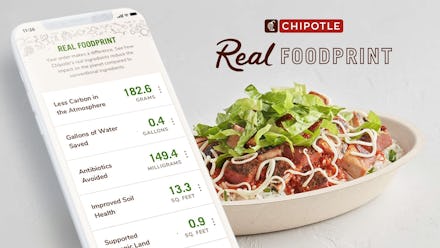Chipotle’s new tool lets you track the environmental impact of your burrito

On Monday, Chipotle launched a sustainability tracker called Real Foodprint. The tracker calculates the impact of your order based on five metrics: less carbon in the atmosphere, water saved, improved soil health, supported organic land, and antibiotics avoided. It's part of the company's sustainability efforts encouraging conscious consumption.
The browser version of the tracker features a mock smartphone where visitors can whip up their usual order and see how it impacts each metric. These totals will also show up after a customer makes an order using the online menu or app.
"While our guests can make good choices for the planet by simply eating at Chipotle, the radical transparency provided by Real Foodprint also holds us accountable to improve our practices and source more sustainably over time," said Caitlin Leibert, head of sustainability at Chipotle, in a press release. "It is the combination of transparency for our guests and Chipotle's commitment to higher standards that make Real Foodprint so impactful."
Statements from Chipotle indicate the company is committed to maintaining this transparency for the long term. However, the metrics themselves aren't very clear at first glance. It's easy to wonder where they come from and what these categories mean.
The website has a section dedicated to explaining each of the metrics and their impact on the environment. These metrics come from a collaboration with HowGood, an independent research group that manages the world's largest database on sustainable foods. HowGood took each of Chipotle's 53 ingredients and compared them to other averages in the restaurant industry to determine each dish's impact.
This has led to some criticism against the usefulness of the tool. "That means your chicken burrito's environmental footprint is being compared to the footprint of a chicken sandwich from McDonald's or Popeyes," wrote Fast Company columnist Mark Wilson. This can be misleading; it gives customers the satisfaction of making sustainable choices even when choosing far less sustainable ingredients like meat.
"Chipotle's incredible tool manages to sidestep this whole uncomfortable introspection about consuming meat and dairy — because Chipotle is comparing its ingredients to those of other companies, an area it tends to be superior, rather than comparing the impact of its own beef vs. tofu or sour cream vs. none," Wilson wrote.
Another strange flaw Wilson noted was in the way the calculator presented its numbers. For example, selecting veggie for a burrito would show zero for antibiotics avoided, whereas selecting chicken shows 42.3 milligrams of antibiotics avoided. This would imply that the veggie filling doesn't avoid any antibiotics — when the reality is that no antibiotics were used for the veggie filling in the first place. Why the calculator doesn't say "N/A" instead is puzzling.
Still, the Real Foodprint tracker isn't a bad start. Yes, in its current iteration, it basically praises anyone for ordering anything at Chipotle without informing diners about more sustainable choices. But any attempt toward more transparency should be welcome news for environmentalists. At the least, perhaps this calculator could help eco-conscious consumers think twice about whether they want to grab a salad from Wendy's or Chipotle.